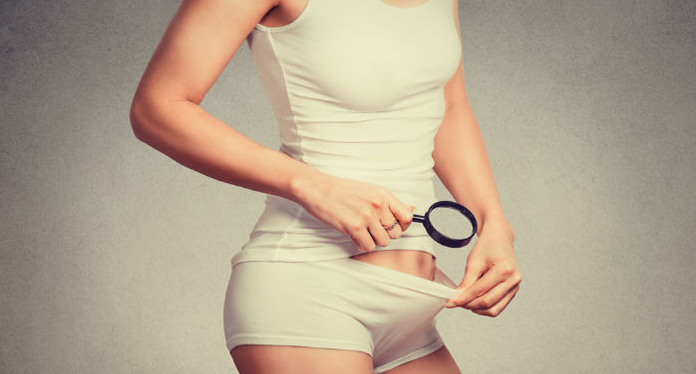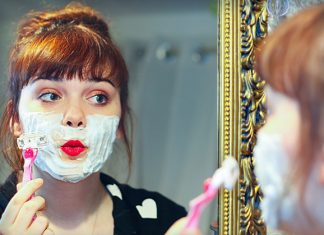Vaginal boils are inflamed bumps filled with pus that occurs on the outside skin of the vagina. Vaginal bumps generally develop in the region that grows pubic area. In some cases, one can find boils on the labia region of the vagina as well.
Vaginal boils happen when a hair follicle gets blocked, and an infection develops in the follicle area. The boil initially will look red and small and, over time, grow into a painful swollen spot with either white or yellow fluid.
Vaginal boils can sometimes resemble a pimple. So, if you are not sure, it is better to consult a doctor for a proper diagnosis.
Otherwise, boils are hardly a grave matter. Usually, it disappears on its own within a few days. The stubborn ones may take longer, but proper medications will reduce them. There are medicines to remove the pain and mitigate the effects of the infection until the boil goes away.
In extremely severe cases, the doctor may cut or go for lancing the boil and then drain away from the infection. Home remedies are the best way to heal vaginal boils as they are always safer and come with fewer to no side effects. Let us look at how to get rid of boils in a private area.
Home remedies for boils on a private area
Boils are not permanent problems, and they disappear within a few days or weeks. With the help of home remedies, you can ease your symptoms and speed up the healing process.
Do not touch your boils unless you have washed your hands with antibacterial soap and warm water. Otherwise, you will introduce more germs and bacteria and affect the already sensitive area.
After you finish the treatment on the area, wash your hands in the same procedure to avoid spreading bacteria to other body parts. Let us look at the best home remedies for boils in a private area.
1. Do not prick
Resist your temptation of popping or pricking the vaginal boil. If you do so, firstly, it will hurt and get more sore, and secondly, it will release bacteria and cause infection.
2. Application of a warm compress
Soak a soft cloth with slightly warm water and then squeeze out the excess water. Then, place the fabric over the boil and compress it slowly. Repeat the process and then leave it for 10 minutes.
You can repeat the process three to four times a day for a faster cure. The heat from the compress will also help promote better blood circulation, which will help the white blood cells fight the infection.
3. Wear loose and comfortable clothes
Tight clothing can lead to the formation of vaginal boils due to constant friction and rubbing on the fragile skin of the vagina. Wearing clean and dry underwear is very important.
4. Ointment for vaginal boils
Petroleum jelly ointment can help to cure the boil. Moreover, the application of the balm will help to prevent friction. Use an antibiotic ointment like combined neomycin, bacitracin, and polymyxin B to avoid the increasing growth of the infection.
5. Over-the-counter painkillers
Over-the-counter painkillers can help to reduce inflammation and reduce the pain the boil causes. Ibuprofen and acetaminophen can do miracles.
If the above home remedies do not cure the problem within weeks, it is better to fix an appointment with your doctor. In severe cases, medical treatment from the doctor is essential.

Causes of Vaginal Boils
Let us know the possible origins of vaginal boils so that we can take proper preventive methods.
1. Harmful bacteria
Harmful bacteria like Escherichia coli, Staphylococcus aureus, and Chlamydia trachomatis are responsible for the growth of vaginal boils and infections.
2. Skin conditions
Folliculitis is a skin condition that happens when bacteria infect the follicles of pubic hair. This infection usually occurs as an adverse effect of waxing and shaving in the pubic area. The bumps gradually turn painful and change into boils if left untreated.
3. Sexually transmitted infections
Sexually transmitted infections can be a significant reason for vaginal boils. Even genital piercings can also lead to vaginal boils.
According to many research and studies, women with thicker pubic hair and oily skin are at a higher risk of vaginal abscesses.
4. Cysts
Bartholin gland cyst can be another factor the cause of vaginal boils. Bartholin gland is present under the skin close to the vaginal opening. When the gland gets blocked, it leads to a hard round bump or a cyst. Leaving it untreated can cause infection, and eventually, a boil will form.
How to prevent future boils
It is not possible to avoid vaginal boils throughout your life. What you can do is reduce the possibilities. Some tips can help to reduce the risk of boils from happening in the future.
1. Change your razor frequently
A dull razor with rusted blades will increase the chances of ingrown hair and hair follicles infections. You must change your razors every three to four weeks at the most. Keep the razor clean till you replace it with another new one.
2. Never share razors
Keep your razors dry and clean, and never share them with someone. Each person should use their own razor. The bacteria responsible for the growth of boil can either pass onto others or even get infected if you use someone else’s.
3. Always shave during the shower-time
Never run your razor on dry skin. Always apply a moisturizing lotion or cream to the vaginal area to reduce the chances of friction and forming of bumps.
In the shower, wet the area and apply a creamy herbal soap before using a razor on the vaginal skin.
4. Shave in the same direction of hair growth
Shaving in the same direction of hair growth will avoid the chances of ingrown hair.
5. Avoid highly fragranced products
Highly fragranced products like soaps, dyes, and powder may irritate you if they do not suit your skin type. The irritation and itching feel can grow over time and cause vaginal infection and the formation of boils.
6. Exfoliation
If you wax or shave your pubic area often, it is better to exfoliate the area at least twice a week. Exfoliation can help to open up the clogged hair follicles and allow proper hair growth.
7. Take antibiotics
Always complete the entire prescription of the dosage of medication recommended by the doctor to treat the infections completely. Leaving or stopping the medical course in the middle can again lead to infection.
8. Treat for staphylococcus or staph infection
If you suffer from recurring vaginal boils, your doctor may ask for a sample of the pus that forms in the vaginal boils to test and determine the bacteria responsible for the boils. This will allow the doctor to treat your boils in the right way with the correct medication. Staphylococcus aureus bacteria can cause recurring boils and infections eventually. Your doctor knows the perfect way to treat the problems.
Ideally, a vaginal boil shrinks and disappears in a week. If it becomes a recurrent or a chronic problem, seeking medical help is the best thing you can do.






